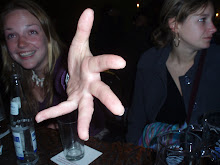One thing that I was glad to be reminded of was just how terrified I was to study abroad, and how much of a challenge I found it. It's easy to look at the world now and find it so simple to hop on a plane. I forget so easily that this is something I had to work at.
It's good to look back and look for the achievements that we don't give ourselves credit for. What used to frighten you? I think you deserve to take a few minutes to remember, and to reward yourself for the work you did to overcome it.
Below is the real-time preserved record of a terrified 21-year-old Meredith leaving to study abroad. Read on if you feel like jogging your memory about what it feels like to be young and scared, but determined. A happy new year to you! I hope you do many things that frighten you this year, and succeed.
8/29/04
After a two hour delay, our plane takes off under a yellow moon. Boston moves away slowly, glowing like golden brocade against the cool, dark Atlantic. As we move up the coast, dark clouds are silhouetted against the blue and yellow gradient of the nearly-night sky. I see a flash of pink light, then another; yellow and pink exploding amongst the charcoal clouds. The passenger seated beside me confirms that it is a thunder storm. I am leaving home; I am taking on the biggest-yet challenge to my strength, my independence, my ability to be the person that I want to be. The sky seems to indulge my sense of weight.
Last night I was a nervous wreck. The anxiety was electric up through my sternum and into my throat. I am very rarely scared to go out on my own, but all week that burning feeling of tension has erupted at random. For so long, a year abroad has been a vague plan, something to fantasize about and talk about but no more concrete than my vague aspirations towards PhD's and published books. Then it became something real, but distant: not even when I enrolled in the programs, when my French visa cleared, when I received my housing assignment; not even when my plane ticket arrived in the mail did the plans turn into impending action in my mind. This week, as I packed up my new clothes into new suitcases, as I said good-bye to this summer and all that happened within that space of time, and all the spaces before it, as I turned to look at the mission I have given myself, this week I became afraid. Again and again I have said, I must be afraid. If I am not afraid, then I am not doing what I need to, I am not breaking down the fences that I feel safe behind. I am not growing. To become bigger, and better, one must leave safety and comfort and become afraid. I have said this again and again. I say it still, and I still believe it. But this week has been the sharp edge of that philosophy, and it has been exhausting, even heart breaking at times.
Now, though, I feel strangely calm. The inside of an airplane is tranquil, inevitable. All the good-byes are over. I know that I will begin to miss the people that I care about. I know in particular that I will miss [redacted]. But, for now, there is that vital sense of pause that we spoke of in Greece. The fluorescent lights on the white plastic interior of the cabin are strangely calming, although it is the same combination of elements that makes me hate malls. The white noise of the engine joins the white light and the white walls and I am afloat alone in my thoughts, interrupted only by the flight attendant coming by with carts full of cokes and pretzels and ambiguous chicken, and by the loud laughter of the man sitting beside me as he watches "Friends" on the tiny TV screens attached to the ceiling.
The sun is coming up as we fly closer to Dublin for our transfer. The horizon line is liquid fire, orange and red. As the light spreads up and across my tiny plastic portal, I discover that what I took to be land or perhaps ocean is in fact clouds; the city skyline on the horizon is illusion. For some reason I feel like crying. I look at my watch and see that I will almost certainly be missing my flight to Paris. I begin to worry about finding my luggage. Then I consciously put the brakes on my thoughts. I take a deep breath.
And I feel that terrible freedom of uncertainty. And I don't want a career track, I don't want a husband, or children, or a home. Fuck grad school. Fuck Cezanne. Fuck Hemmingway. And instead I watch the sunrise and the way it separates into lines, and I try to figure out if the effect is real or a trick of the eye.
I am trying to 'be here now.' I am trying to let go of the past and the future, and allow myself to float the way I always try to tell myself I do. I will not allow myself to be crushed under the weight of a year. I focus only on the thin backlit clouds as they pull apart like taffy. Then the first sliver of sun breaks over the expansive field of clouds and we begin our descent into Dublin.
I notice that the Aer Lingus seat fabric is covered with stitched scrawling handwriting. On the back of the seat in front of me, I make out: "Americans, she would say, are lost people where're they see the fairest... .... they live between two worlds. Their heads are in the clouds."

